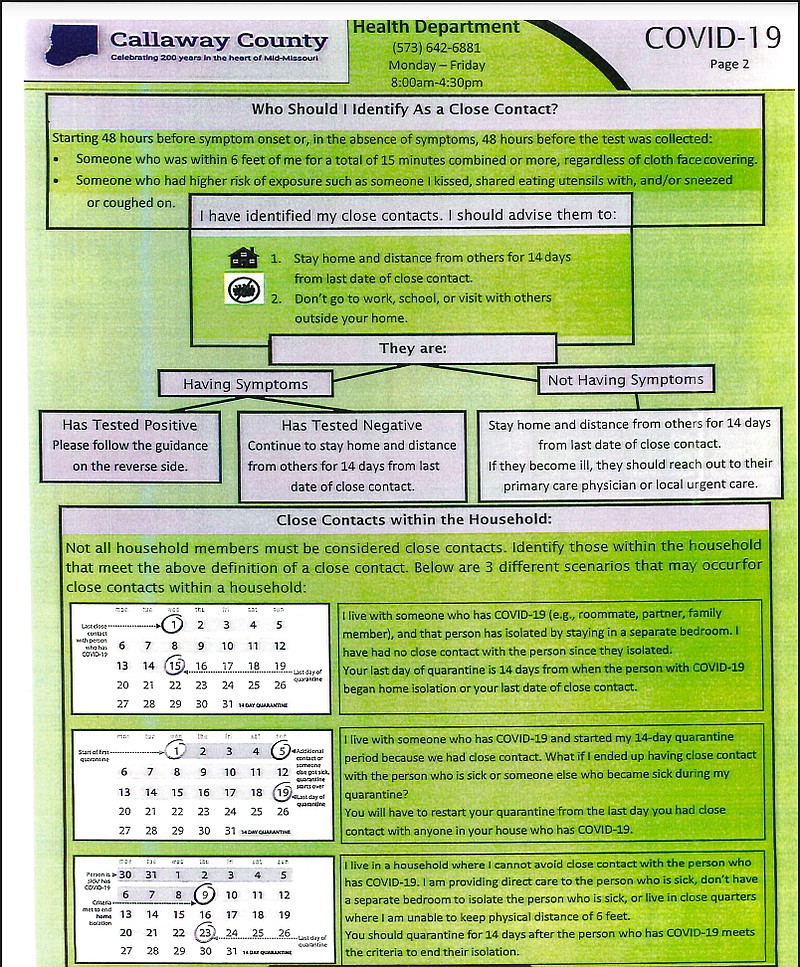Callaway County residents will now be expected to notify their own close contacts after testing positive with COVID-19.
The Callaway County Health Department announced the policy change in a press release Monday, noting county contact tracers will still be aiding businesses, schools and residential care facilities. The health department will also do contact tracing in "if there's a huge need," such as the positive individual being too ill to handle it, Presiding Callaway County Commissioner Gary Jungermann said.
Jungermann framed the change as a move toward more efficient, speedier contact tracing.
"We're trying to alert people to do the right thing much quicker," he said Monday. "(Individuals with COVID-19) get contacted, generally, telling them they're positive, by whoever did testing. Then that place sends all of the documentation to the state and the state generally hangs onto it for several days for whatever reason, then they finally funnel it down to the counties."
By the time the CCHD hears about a particular positive case, it's often five to seven days or more after that person tested positive and began isolating, Jungermann said.
"This whole thing has been a giant nightmare," he added.
Contact tracing poses other challenges as well - sometimes lab results have the wrong contact information for the individual tested, and many people simply don't pick up the phone, or refuse to give information, when one of the county's tracers calls.
"It is our hope that people will feel more comfortable telling their contacts about their positive versus a stranger on the phone," states a CCHD press release.
Jungermann also noted with cases on the rise in Callaway County and the rest of Missouri, handling all of residents' contact tracing needs was "getting to be so much of a challenge." Earlier this month, the health department closed for nearly two weeks to allow contact tracers time to catch up (it reopened last Thursday).
Cole County announced the same policy shift earlier this month, offering a similar rationale.
"We're pretty much following Cole County," Jungermann said.
He said the county and CCHD will continue to monitor COVID-19 numbers and will reevaluate this new system at the end of the month.
"This is not a permanent thing," he said.
As of Sunday, a total of 2,597 Callaway County residents had tested positive for COVID-19 since the beginning of the pandemic, according to the Missouri Department of Health and Senior Services.
How it works
According to Jungermann, every single taxpaying citizen of Callaway County will soon receive a letter in the mail containing information about how to determine contacts. Educational handouts will also be distributed at testing sites within Callaway County. The same information will be posted on the CallawayCOVID19.com website.
"If you receive a call from your doctor with a positive result, you need to take immediate action to slow the spread of the virus within your friends, family and coworkers by following the outlined steps on the educational handout," the county's press release implores. "Please do not wait for a phone call from the health department to follow the steps outlined on the handout."
Close contacts are defined as anyone that the positive person was within 6 feet of for more than 15 combined minutes starting 48 hours prior to becoming symptomatic - or, in the absence of symptoms, 48 hours before the positive test was collected - regardless of cloth face coverings. It also includes anyone who had high-risk exposure to the positive person: someone they kissed, shared eating utensils with or coughed or sneezed on.
After identifying close contacts, the positive individual should contact them and advise them to stay at home and distance from others for 14 days from the last day of close contact. That applies even if the contact has tested negative for COVID-19, the guidance notes.
If the close contact has symptoms, the caller should advise them to reach out to their primary care physician or local urgent care.
A flow chart included with the mailer explains next steps; there's also advice on how to calculate isolation and quarantine times.
The health department won't be following up to conduct additional contact tracing or ensure contact tracing occurred, according to the county's health release - it's all up to the individual who tests positive. Jungermann pointed out the health department doesn't even have the resources to enforce quarantine, much less contact tracing.
However, health department staff will follow up in order to maintain an accurate count of active cases within the county.
"We're still going to work on the recovered list - we'll check to see how things are going and get people moved off the (active) list," Jungermann said.
The health department offers the following advice for reducing the spread of COVID-19:
Stay home if you are sick.
Do not be within 6 feet of others outside of your household for more than 15 minutes combined.
Wash hands often with soap and water for at least 20 seconds, especially before eating. If hand washing is not available, use hand sanitizer.
Avoid touching your eyes, nose, or mouth with unwashed hands.
Face coverings are recommended to be worn when in contact with someone outside of your household within six feet for more than 15 minutes.
"The Callaway County Health Department has observed clusters of positive cases at office buildings, correctional facilities and long-term care facilities," the press release notes. "We have also seen positive cases emerging from social gatherings where physical distancing is not easily maintained."
For additional information, clarification or help with determining your close contacts, call the CCHD at 573-642-6881.

